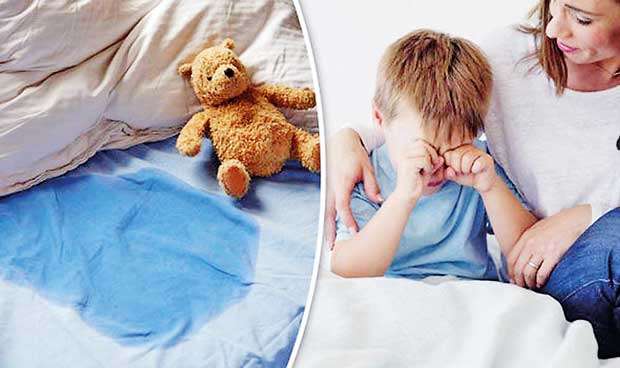Reply To:
Name - Reply Comment

 Bed wetting, medically known as Nocturnal Enuresis, is a common condition in children.
Bed wetting, medically known as Nocturnal Enuresis, is a common condition in children.
It is theuncontrollable passage of urine in a child while asleep. This is experienced with children who are beyond five years of age. This condition is three times more common among boys than in girls. However, occasional bed wetting can be normal up to the age of 6 years, as long as the intervals between wet episodes are getting longer.
At the age of five, one in eight children will have this condition. This number reduces with age. At the age of seven, it is one in twenty and by nine, it is one in forty children. This condition can persist into adolescence and even into adulthood in a minority. By fourteen years of age, only one in one hundred and twenty-five will have this condition.
We spoke to Dr. Apeksha Hewageegana, Consultant Child and Adolescent Psychiatrist attached to the Teaching Hospital Anuradhapura, to enlighten our readers on the topic.
What causes it? 
Is it a problem of parenting? Is it laziness or being defiant? Parents and the sufferer are being accused regarding this condition. However, it is usually due to a number of bodily causes and may also have a genetic basis.
Our body produces a chemical called antidiuretic hormone (ADH). This chemical controls the level of urine production. The secretion of this chemical varies through the day with a higher secretion towards evening. Therefore, the urine production will be low towards evening. Hence, the bladder is less likely to be full during the night. Usually, this day-night cycle of ADH matures between the ages of two and six. However, in some children this maturation may get delayed, leading to high urine production even at night.
When the bladder is full it sends messages to the brain and makes us use the washroom. This happens even during the sleep. Yet, if the child is a deep sleeper or if this messenger system is not fully matured or if the child has both those issues the child may have a problem as he will take longer to wake up.
There may be other bodily reasons such as constipation or drinking too many caffeinated drinks close to bedtime etc. Occasionally, bed-wetting may be due to sleep apnoea, diabetes or urinary tract infection.
Parents may be partly responsible for this condition by passing on the condition to next generation. Which means if you had wet the bed as a child your child has a 40 % chance of wetting the bed.
Had you not wet the bed the chances of developing this condition are fifteen percent. If both parents did have the same problem during their childhood then the chance of their child having bed wetting is 70%. Which means bed wetting is highly inheritable and 70% of children with bed wetting will have another family member who has or had bed wetting in his or her childhood.
Sometimes, bed-wetting may be due to stress in the child’s life. These may include, bullying at school, problems in the family, the death of a loved one etc. The likelihood of bed wetting may increase if the child is embarrassed by the remarks of others regarding bed wetting.
Can they be dry for some time and start having night time accidents later on?
There are two types of night time bed wetting or nocturnal enuresis. That is Primary Nocturnal Enuresis (PNE) and Secondary Nocturnal Enuresis (SNE). PNE is when the child has not still been dry at night since birth for a period more than six months. SNE is when night time accidents start to happen after a dry period of at least 6 months.
How does it affect the child and the family?
Bed wetting can be hard on your child. It can be very embarrassing and stressful for the child as well as the family. It can have a negative impact on a child’s self-esteem, relationships with friends, and school achievement
Children with bed wetting feel guilty and are withdrawn due to the guilt, embarrassment and low self-esteem.
Their social skills may be poor and their school performance may be lower than others. As a result of the distress caused by bed wetting, the child may have more aggressive behaviour, issues paying attention in class and poor self-image.
Children who wet the bed are fearful that their secret may be discovered and they may be teased for that. Therefore, they avoid instances where they have to sleep away from home. For example, they may dislike family vacations and will avoid going on school excursions and camps that require an
overnight stay.
What can you do as a parent to prevent and reduce the frequency of these night time accidents?
If your child has secondary nocturnal enuresis that is, starting to wet bed after a period of dryness for up to six months, it is very important that you get medical advice early. During these instances the primary issue is usually a medical condition or an emotional problem that needs to be addressed.
It is very important to seek medical advice even in the case of primary nocturnal enuresis, to be sure that there are no medical causes. If there are no medical causes treatment begins with some strategies to be followed at home. These strategies will help to keep the child dry until the maturation process of the hormones and messenger systems are complete. However, if the child is older and or if the problems persist even after applying those strategies then starting on medication may be considered. Some of the home strategies that you can adopt are
listed below.
As a parent, your first step in helping your child is understanding and acknowledging what he or she is experiencing. Remember that the accidents aren’t the child’s fault and happen when they’re sleeping. If they could they would surely control it. During most of the instances the bed wetting is not the main problem. The main problem is how the child and family react to it.